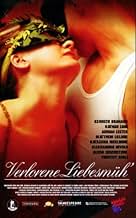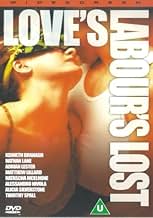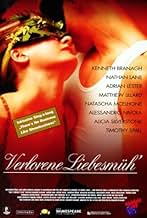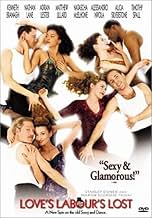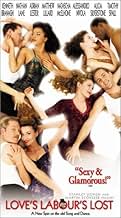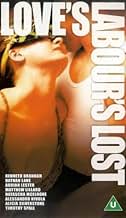Regisseur Kenneth Branagh hat die klassische Shakespeare-Geschichte wie ein klassisches Musical aus den 1930er Jahren gedreht. Er erzählt die Geschichte von vier besten Freunden, die der Lie... Alles lesenRegisseur Kenneth Branagh hat die klassische Shakespeare-Geschichte wie ein klassisches Musical aus den 1930er Jahren gedreht. Er erzählt die Geschichte von vier besten Freunden, die der Liebe abschwören.Regisseur Kenneth Branagh hat die klassische Shakespeare-Geschichte wie ein klassisches Musical aus den 1930er Jahren gedreht. Er erzählt die Geschichte von vier besten Freunden, die der Liebe abschwören.
- Auszeichnungen
- 1 Gewinn & 2 Nominierungen insgesamt
Handlung
WUSSTEST DU SCHON:
- WissenswertesThe actors did their own singing.
- PatzerWhile the movie's concentrating on what is obviously WW2, one of the paper shown announces the end of the war on November 11, which is in fact the date of the end of WW1 in 1918 (the end of WW2 being on May 8, 1945 in Europe and August 15 in Asia).
- Zitate
Berowne: From women's eyes this doctrine I derive: They are the ground, the books, the academes, from whence doth spring the true Promethean fire. O, we have made a vow to study, lords, and in that vow we have forsworn our books; For when would you, my liege, or you, or you in leaden contemplation have found out such fiery numbers as the prompting eyes of beauty's tutors have enriched you with? Other slow arts entirely keep the brain, and therefore, finding barren practisers, scarce show a harvest of their heavy toil; But love, first learned in a lady's eyes, lives not alone immured in the brain but with the motion of all elements courses as swift as thought in every power and gives to every power a double power, above their functions and their offices. It adds a precious seeing to the eye: A lover's eyes will gaze an eagle blind. A lover's ear will hear the lowest sound. Love's feeling is more soft and sensible than are the tender horns of cockled snails. Love's tongue proves dainty Bacchus gross in taste, for valour, is not Love a Hercules, still climbing trees in the Hesperides? Subtle as Sphinx, as sweet and musical as bright Apollo's lute, strung with his hair. And when Love speaks, the voice of all the gods make heaven drowsy with the harmony.
[begins to sing the song "Cheek to Cheek"]
Berowne: Heaven, /I'm in heaven. /And my heart beats so that I can hardly speak...
- Alternative VersionenThe UK Region 2 DVD contains 5 deleted scenes:
- The boys are arguing about the girls and about breaking the vows the made.
- Moth, Constable Dull, Holofernia, Sir Nathaniel and Costard and discussing what to perform for the king, the princess and their company. They descide upon performing ^Óthe 9 worthies^Ô. Parts of this scene can be seen in the news reels.
- The third extra scene is an extended version of the scene were the girls are discussing and mocking the gifts they received from the men. The extra parts are extra dialogue for Katherine and Rosaline. Katherine tells the story of a girl who died from melancholly. Rosaline has an extended part of dialogue in which she mocks the men and Berowne specifically.
- There is a alternative scene for the masked dance scene more true to the story of Shakespeare. The boys dress up as Russians who specially came to visit the girls.
- The fifth scene is the performance of 'the 9 worthies' by the supporting characters.
- The UK Region 2 DVD does also contain various outtakes. Some of these were cut (ca. 4 seconds) to maintain the "U" rating.
- SoundtracksI'd Rather Charleston
by George Gershwin and Desmond Carter
Performed by Kenneth Branagh, Alessandro Nivola, Matthew Lillard and Adrian Lester
I was lucky enough to see this film originally at a special screening introduced by Kenneth Branagh and Alicia Silverstone, which boosted the preview audience into a higher gear of excitement and expectation than would be usual, so the experience was a little like the prospect of drinking lots of champagne –delightful, but somehow never as good as the idea of it!
Upon re-watching the film recently, I think the film in fact rather MORE resembles one of those very fancy, colourful cocktails you order when on holiday, with tiny umbrellas and exotic fruit and flowers sticking out and looking enormously tempting on the menu and when brought to you, but always somewhat impractical to drink and with ingredients that don't quite mix together satisfyingly enough. With Love's Labour's Lost the conceit of transforming Shakespeare's rich ideas into classic Hollywood musical numbers to bring across certain moods and emotional moments is a fun recipe, but it seems to me to clash too often with the actual text the film is based on. Now, admittedly much of Shakespeare's play is very obscure and difficult to understand compared to other plays he wrote, and severe editing was going to be inevitable; but putting in musical number after musical number as a replacement seems more a way of padding the film to arrive at a decent length rather than really moving the story along. In fact, many of the musical numbers –skillfully and cheekily staged though some of them are– just get in the way of things, and frequently I found myself wishing that Branagh had been even more faithful to Shakespeare and instead kept in more of the actual play itself. Thus I was pleasantly surprised to find a number of deleted scenes on the DVD of the film that sadly never made it to the final cut. I think these should have been kept in because they help make more sense of the story.
The diversity of performers that comprise the cast is quite interesting and there are some magnificent individual performances, though again the range of different styles doesn't always gel on screen. To a certain extent this was also true of Branagh's Much Ado About Nothing and Hamlet. Everyone is doing their own little film, and sometimes it works, sometimes it doesn't. Timothy Spall's Don Armado is perhaps one of the most outrageous performances ever seen on screen, but it is totally in keeping with the character as written. And both he and Nathan Lane (as Costard the clown) bring an essential element of sadness to their otherwise comic roles that is very moving. But the double quartet of lovers that form the central romantic story of the film is a very mixed bag indeed. Branagh understandably gives the plum role of Berowne to himself and sells his Shakespeare with that admirable deftness that is uniquely his, but he is really too old for the part and this works against him here. I also feel at times he should have directed himself more astutely or had better assistance at doing so, for it is largely the scenes in which he does not appear that work best –simply because at such times he, as director, is able to concentrate fully on the other performances. The film also seems unable to break itself totally free from its staginess to become the truly filmic musical it aspires to be.
So, I am quite ambivalent about this film. I DO like and enjoy it, and applaud Branagh for tackling a lesser-known Shakespeare comedy, and with such gusto, but I SO wish I were able to like it more and be fully satisfied by it –and by the greater film that is in its heart..
Top-Auswahl
- How long is Love's Labour's Lost?Powered by Alexa
Details
- Erscheinungsdatum
- Herkunftsländer
- Sprache
- Auch bekannt als
- Love's Labour's Lost
- Drehorte
- Produktionsfirmen
- Weitere beteiligte Unternehmen bei IMDbPro anzeigen
Box Office
- Budget
- 13.000.000 $ (geschätzt)
- Bruttoertrag in den USA und Kanada
- 299.792 $
- Eröffnungswochenende in den USA und in Kanada
- 24.496 $
- 11. Juni 2000
- Weltweiter Bruttoertrag
- 299.792 $
- Laufzeit1 Stunde 33 Minuten
- Sound-Mix
- Seitenverhältnis
- 2.39 : 1
Zu dieser Seite beitragen



